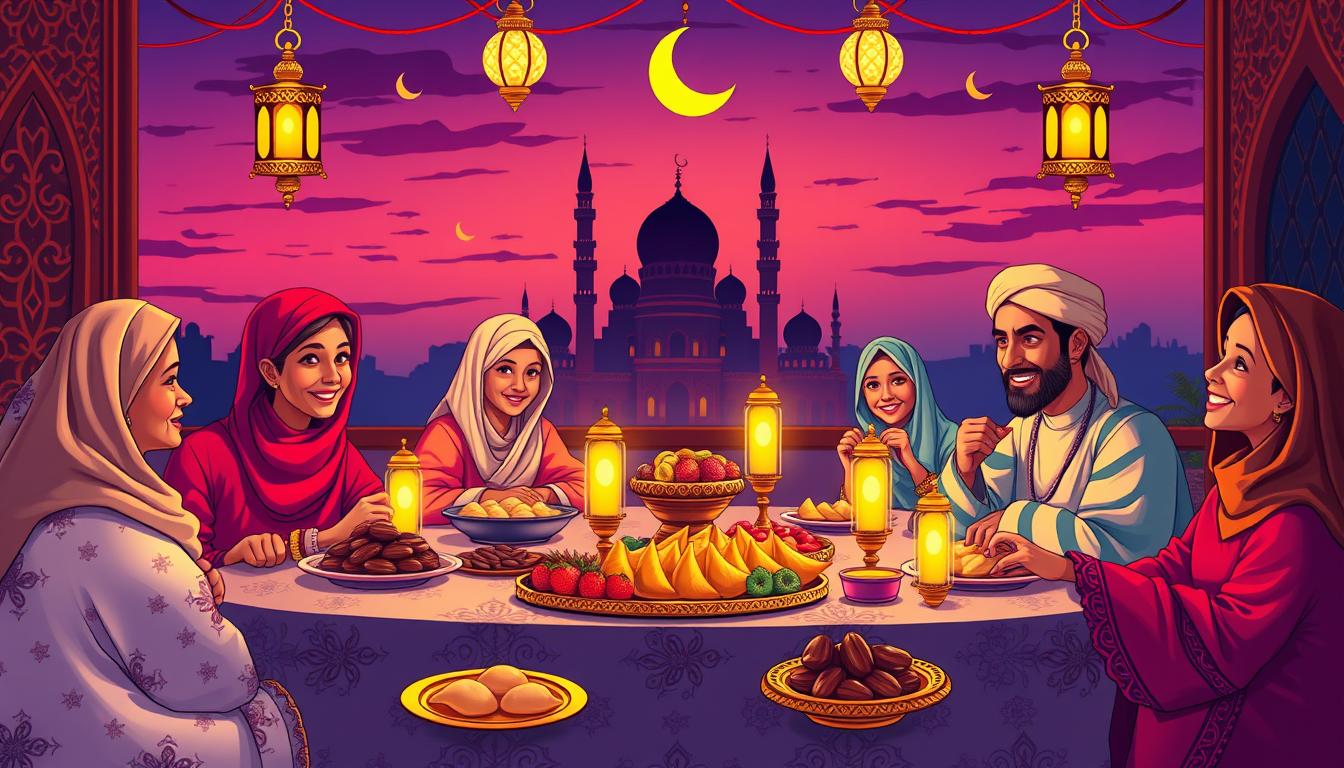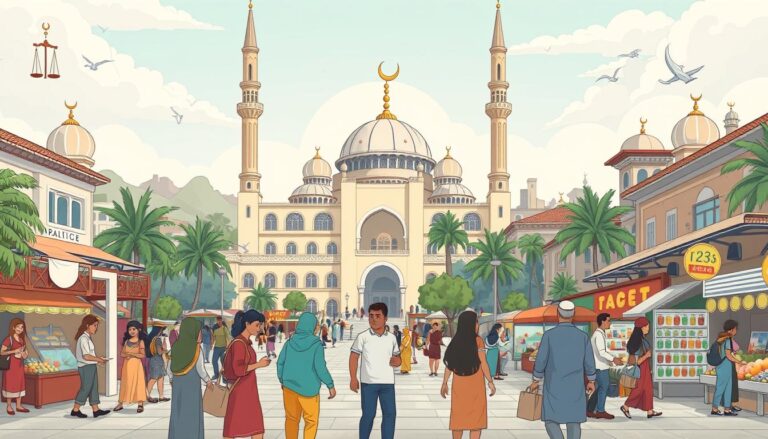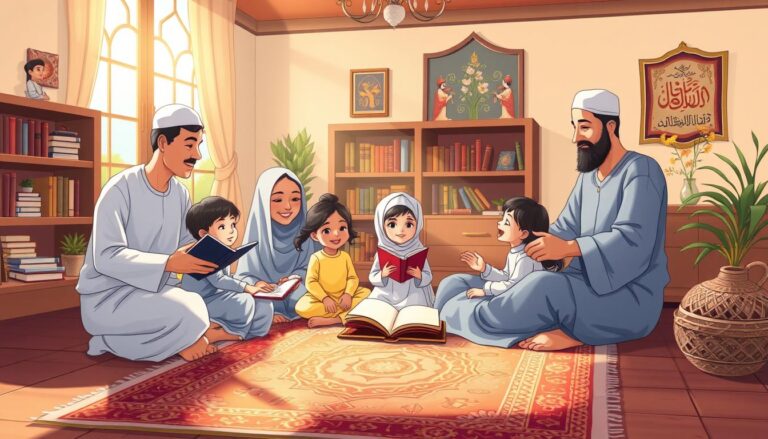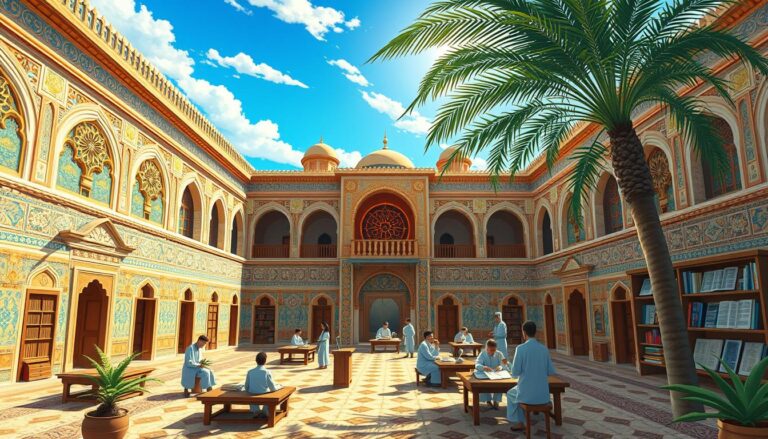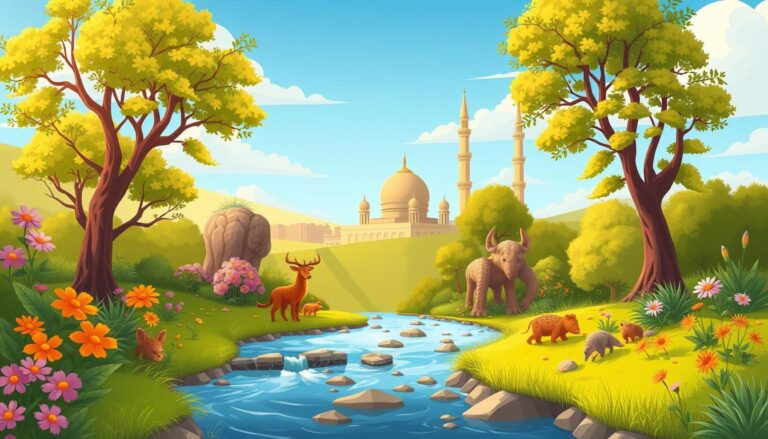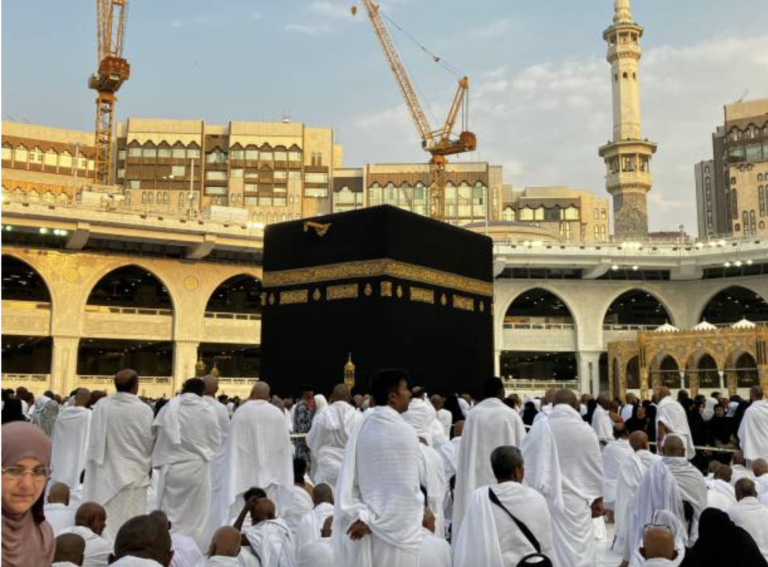5 Facts About Ramadan and Eid You Didn’t Know
Did you know Ramadan, the Islamic holy month, can lead to surprising weight gain despite its focus on fasting? This paradox is just one of the many intriguing aspects of this sacred time for Muslims worldwide. As we delve into the rich tapestry of Ramadan traditions and Eid al-Fitr celebrations, we’ll uncover fascinating facts that showcase the depth and diversity of Muslim cultural practices.
From the shifting dates of Ramadan due to the lunar calendar to the unexpected popularity of certain beverages during this period, the Islamic holy month is filled with surprises. We’ll explore how fasting from dawn to sunset impacts daily life, the significance of pre-dawn and sunset meals, and the joyous festivities that mark the end of this spiritual journey.
As we unravel these lesser-known facts, we’ll gain a deeper appreciation for the cultural richness and spiritual significance of Ramadan and Eid. Whether you’re familiar with these Muslim practices or learning about them for the first time, prepare to be enlightened by the unique customs and traditions that make this period so special for over a billion people around the globe.
Key Takeaways
- Ramadan follows the lunar calendar, causing its dates to shift annually
- Fasting during Ramadan can last up to 17 hours in some regions
- Vimto sales spike significantly in the Middle East during Ramadan
- Weight gain is common during Ramadan despite daily fasting
- Eid al-Fitr marks the end of Ramadan with a three-day celebration
- Charitable acts, known as zakat, are an important part of Ramadan
- Fasting exceptions exist for certain groups, including travelers and the ill
Understanding Ramadan: The Holy Month of Fasting
Ramadan is a sacred month for nearly 1.9 billion Muslims. It’s a time for fasting, which is a key part of Islam. During Ramadan, Muslims focus on growing spiritually, practicing self-control, and coming together as a community.
The Lunar Calendar and Ramadan’s Shifting Dates
The Islamic calendar is based on the moon. This means Ramadan moves back by about 11 days each year compared to the Gregorian calendar. The changing dates affect how long Muslims fast, as daylight hours vary by season and location.
Fasting from Dawn to Sunset: Rules and Exceptions
Muslims don’t eat, drink, smoke, or have sex from dawn to sunset in Ramadan. In some places, fasting can last up to 20 hours because of long days. But, kids, pregnant women, the elderly, and those with health problems don’t have to fast.
Spiritual Significance of Ramadan
Ramadan is more than just fasting. It’s a time for deep thinking, more prayer, and helping others. Muslims try to grow closer to their faith, learn self-control, and feel for those who are less fortunate. Ramadan teaches us about kindness and being thankful every day.
“Ramadan is the month in which the Quran was revealed as guidance for mankind.”
The Importance of Suhoor and Iftar During Ramadan
Ramadan is a time of great food and feasting in Muslim culture. Suhoor and Iftar, the two main meals, are very important. They give strength and nourishment to those fasting.
Suhoor is eaten before dawn. It’s best to have hearty, nutritious foods and drink plenty of water. Families come together for Suhoor, making their bonds stronger.
Iftar is eaten at sunset and starts with dates and water. This is based on the teachings of Prophet Muhammad. After breaking their fast, people enjoy many dishes together with friends and neighbors.
In many Muslim-majority countries, work and school hours change. This lets people have more time for evening activities and community events.
“Ramadan Mubarak” is a common greeting during this time, expressing wishes for a blessed month.
As Ramadan goes on, fasting gets easier for many. Studies show that around the halfway point, people feel more energetic and focused. The last ten days are especially important, with most people fully adapted to fasting.
- Over a billion Muslims worldwide celebrate Ramadan
- Fasting is one of the five core principles of Islam
- Young children, pregnant women, the elderly, ill, and travelers are exempt from fasting
Staying healthy during Ramadan is key. Experts suggest eating hydrating foods like cucumbers and watermelon at Suhoor and Iftar. Taking short walks and wearing light colors in the sun also helps keep well-being during fasting.
5 Facts About Ramadan and Eid You Didn’t Know
Ramadan traditions and Muslim cultural practices are full of interesting facts. Let’s dive into some lesser-known details about this holy month and the celebration of Eid al-Fitr that follows.
The Night of Power: Laylat Al Qadr
Laylat Al Qadr happens in the last ten days of Ramadan. It’s the night the Quran was revealed to Prophet Muhammad. Muslims pray a lot on this night, seeking blessings and forgiveness.
Surprising Popularity of Vimto
In some places, Vimto’s popularity soars during Ramadan. This fruit-flavored drink’s sales skyrocket, especially in the Middle East during the fasting month.
Weight Gain Paradox
Despite fasting, many people gain weight in Ramadan. Big iftar meals and less activity during the day are reasons for this trend in Muslim culture.
Traveling During Ramadan
Traveling in Ramadan requires knowing local laws. Some places ban eating in public during fasting hours, affecting everyone.
Ramadan as the Month of Giving
Zakat, or obligatory charity, is key in Ramadan. It shows the importance of giving and helping others. Muslims give to those in need, showing compassion and community support.
“Eid” means “oft-returning,” reflecting humanity’s inherent desire for happiness and celebration.
With over 1.6 billion Muslims fasting worldwide, Ramadan is the most observed religious event globally.
Breaking the Fast: Traditional Foods and Customs
Ramadan is a time of feasting and food in Muslim culture. When the sun sets, people come together to break their fast with Iftar. This meal strengthens family bonds and community ties.
The Significance of Dates in Iftar
Dates are a key part of Iftar. They follow Prophet Muhammad’s example. These fruits are full of sugar and fiber, giving quick energy after fasting.
Over 1.6 billion Muslims fast during Ramadan. This makes breaking the fast with dates a universal tradition.
Popular Hunger-Busting Drinks Across Cultures
Every culture has its own drink to end fasting. In the Middle East, jallab is a favorite. It’s made from dates, grapes, and rose water.
In Southeast Asia, bandung is loved. It’s a milk drink with rose syrup. These drinks help the body recover from fasting.
Iftar meals are filled with traditional dishes. Soups, stuffed vine leaves, and honey-soaked pastries are common. In some places, food sales rise by 30% during Ramadan.
Ramadan is not just about abstaining from food and drink. It’s a time for spiritual reflection, community bonding, and sharing the blessings of a meal with loved ones.
Ramadan Practices Around the World
Ramadan is celebrated differently in various cultures, making it a rich tapestry of faith. With 1.8 billion Muslims fasting worldwide, Ramadan highlights the diversity of Muslim traditions.
In some places, iftar is a simple family meal. In the UAE, it’s a grand feast. Many countries hold communal iftars, bringing people together. Some even use cannons to signal the end of fasting.
The phrase “Ramadan Mubarak” or “Ramadan Kareem” is heard everywhere, wishing blessings. It captures the spirit of giving that Ramadan embodies. During this month, Muslims often give more to those in need.
“Ramadan is not just about fasting from food. It’s about fasting from bad habits and nourishing the soul.”
Fasting rules vary. Adults fast from dawn to sunset, while kids start around 11 or 12. Some kids start with half-day fasts at 6 or 7, learning self-control. This helps them grasp Ramadan’s deeper meaning.
- Muslims recite the Quran intensively
- Many abstain from bad habits like gossiping
- Small, healthy meals are encouraged to maintain focus
As Ramadan moves through the solar year every 30 years, its practices change. Fasting in summer or polar regions is especially challenging. It shows the commitment of those who follow this key Islamic tradition.
The Culmination of Ramadan: Eid al-Fitr Celebrations
Eid al-Fitr is a joyous end to Ramadan. It’s a three-day festival where Muslims come together to express gratitude and celebrate. The festival starts when the new crescent moon is seen, marking the tenth month in the Islamic calendar.
Sighting the New Moon: Marking the End of Ramadan
The new moon sighting is key for Muslims everywhere. It means the end of fasting and the start of feasting. Families look up at the sky together, waiting for the moon to appear.
When the moon is spotted, the news spreads fast. Then, the preparations for Eid al-Fitr celebrations really kick off.
Eid Traditions and Festivities
Eid al-Fitr customs vary, but joy and gratitude are always present. Muslims attend special prayers in large groups. They wear new clothes, exchange gifts, and visit loved ones.
The phrase “Eid Mubarak” fills the air, spreading happiness and kindness. Food is a big part of Eid al-Fitr. Homes are filled with delicious dishes, and sweet treats like Eid cookies are a favorite.
Large meals are shared with neighbors and those in need. This shows the importance of community and charity during Ramadan.
“Eid al-Fitr is a time of joy, reflection, and renewed faith. It reminds us of the importance of gratitude, compassion, and unity.”
Eid al-Fitr customs and rituals beautifully wrap up Ramadan. They highlight the values of faith, family, and community that are central to Islamic traditions.
Health and Wellness During Ramadan
Fasting during Ramadan brings health challenges. Muslims don’t eat or drink from sunrise to sunset for 30 days. They need to plan carefully to stay healthy.
Maintaining Nutrition and Hydration While Fasting
Drinking water is key when you can eat. Many wake up early for Suhoor, the meal before fasting. Foods like fruits and veggies help keep you hydrated.
Some think fasting leads to weight loss, but it’s not always true. In fact, some might gain weight from big iftar meals. Eating nutritious meals after fasting is crucial.
Balancing Spirituality and Physical Well-being
Ramadan is more than fasting. It’s a time for self-reflection and growth. But, keeping your body healthy is also vital, especially in hot weather.
It’s important to listen to your body. Some, like kids and the elderly, don’t have to fast. Dates are a traditional choice to give energy after fasting.
“Ramadan is not just about abstaining from food and drink. It’s about purifying the soul, practicing self-discipline, and focusing on spiritual growth while taking care of our physical well-being.”
Community and Family Aspects of Ramadan and Eid
Ramadan traditions unite Muslim communities in special ways. Over 1.6 billion Muslims worldwide take part, making it the most observed religious practice. Mosques become busier, especially for evening prayers.
Cities with big Muslim populations, like Dearborn, Detroit, and New York City, support their Muslim residents. They adapt to help during Ramadan.
Family ties grow stronger during Ramadan. Muslim kids start fasting half-days around age 7 or 8. They gradually move to full days after puberty.
Iftar, the meal that breaks the fast, brings together more than just family. It includes friends and neighbors. This shows the importance of community and sharing. Some restaurants see a 30% increase in business during Ramadan because of these gatherings.
Eid al-Fitr celebrations end Ramadan with joy. They highlight the importance of giving back. Muslims give more to charity and volunteer.
Zakat, a yearly donation for those who can, helps support the needy. These practices not only deepen faith but also create strong community bonds. Ramadan and Eid are truly special times of the year.
Source Links
- Top 10 Facts About Ramadan! – Fun Kids – the UK’s children’s radio station
- 10 things to know about Ramadan
- Ramadan | Fasting, Traditions, & Facts | Britannica
- 5 things you need to know about Ramadan – College of Arts and Sciences
- 9 questions about Ramadan you were too embarrassed to ask
- Ramadan: Everything You Need To Know
- 11 things to know about Ramadan
- Five Things You Might Not Know About Eid
- 10 Surprising Facts About Ramadan that You Didn’t Know
- Seven facts you didn’t know about Ramadan – the holiest month for Muslims
- No title found
- 9 Things You Probably Didn’t Know About Ramadan
- Everything you need to know about Ramadan, Islam’s holiest month
- The Significance of The Holy Fasting Month Ramadan in the life of Muslims
- When is Ramadan 2024? | The history of Islam’s holiest month
- VidoRev – Video WordPress Theme
- 7 Things You Didn’t Know About Ramadan and Food
- Five common questions about Ramadan and fasting | Equity, Diversity, and Inclusive Excellence | Gallaudet University
- 5X Fest | Learning about the meaning of Ramadan from those who celebrate
- Here’s How Muslim Parents Can Help Kids During Ramadan

